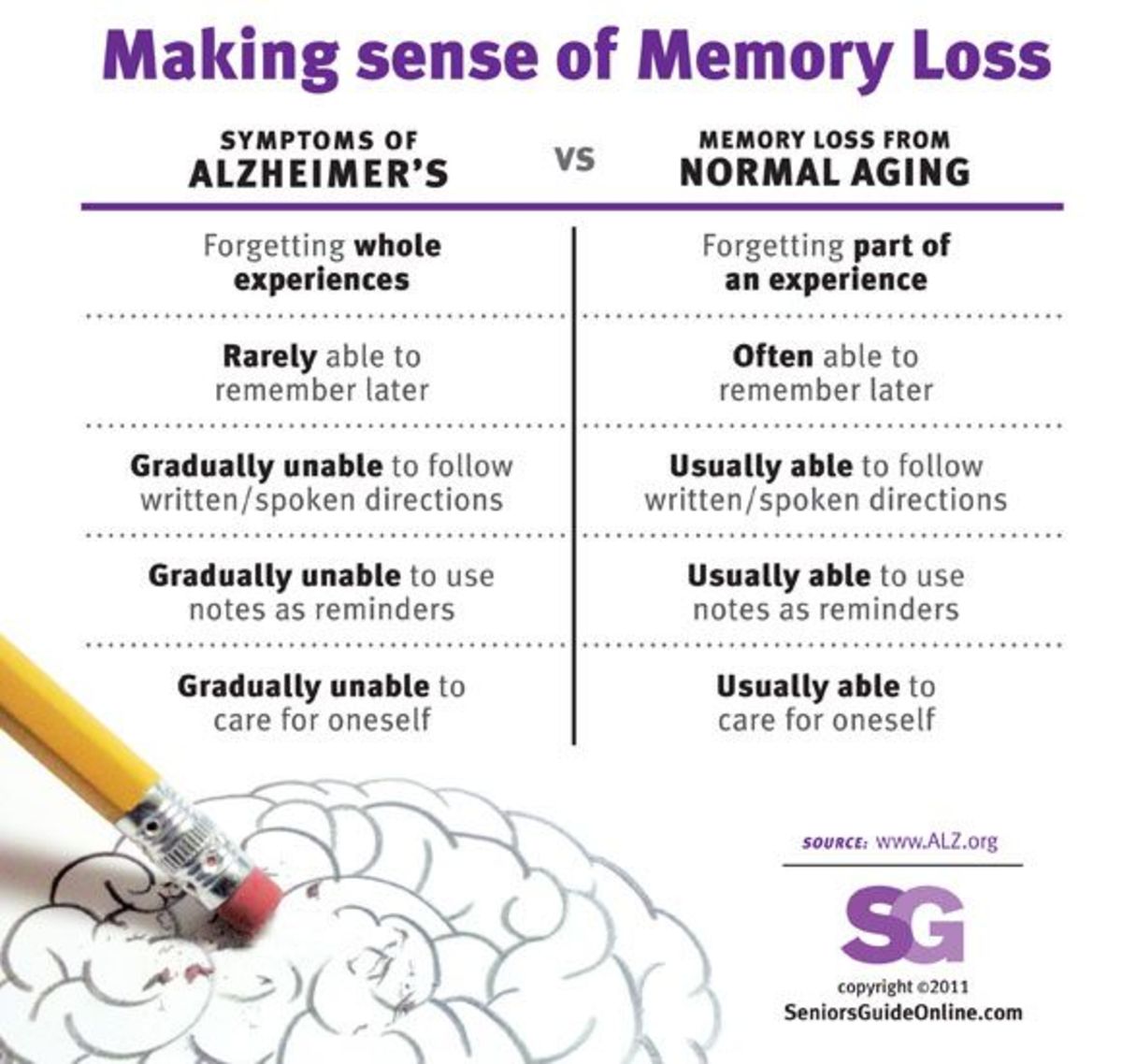
Age Differences in Memory Loss
According to the Merriam-Webster dictionary, memory is defined as “the power or process of reproducing or recalling what has been learned and retained especially through associative mechanisms.” Memory is one area of cognition that is different for children, young adults, and the elderly. Below, these differences are outlined, along with ways for improving or maintaining memory for different age groups.
Children differ from adults in a few ways when it comes to the different types of memory. “With respect to long-term memory, young children typically have excellent recognition memory but relatively poor recall memory,” (Matlin, 2009, p. 460). When it comes to working memory though, older children’s ability to recall items almost matches that of a college student (Matlin, 2009).
Another major difference between memory of a child and memory of an adult is that children’s memories are not set in the brain until a later age. Carole Peterson, a psychology professor in Canada, did a study regarding memory in young children. She interviewed kids by asking them what their three earliest memories were. The first time she did this, it was found that the younger children reported earlier memories than the older children did. The same children were re-interviewed two years later on the same memories. When the second interview was completed, only ten percent of children aged four to seven could remember their first memories. In the older children though, thirty-six percent could recall their earliest memories. Peterson concluded from this study that it is not until age ten that memories are set in the brain and available later for recall (Brown, 2011).
Be patient with your loved ones, everyone can act like Dory sometimes.

Age Differences In Memory Loss Cont.
The three age brackets, children, adults, and the elderly, all face differences when it comes to memory. The human brain reaches its peak performance in the lower twenties and then starts to decline in the years following. Once a person reaches age forty, the cortex starts to shrink, which causes faint changes in a person’s ability to multitask or remember certain things like new names. A normal brain is aging, and with aging comes a decrease in blood flow. This decrease makes it harder for the brain to call different areas into work (American Psychological Association, 2014).
The elderly differ from young/middle adults depending on the type of memory (American Psychological Association, 2014). As a person gets older, different types of memory are affected (American Psychological Association, 2014). Episodic, source, and flashbulb memory are the types most affected (American Psychological Association, 2014). Procedural memory and semantic memory that deals with facts and concepts are affected the least (American Psychological Association, 2014). On a memory test involving recalling numbers that are in order, younger and older adults perform similarly (Matlin, 2009). When the test involves more complex tasks, such as multitasking, however, there are large differences between younger and older adults (Matlin, 2009).
Solve Puzzles: A woman I knew lived to be 102 and worked Sudoku and crossword puzzles until the day she died. I think she had a better memory than I do!

There are different types of memory.
As mentioned earlier, semantic memory is one type of memory that is affected the least in the elderly. When it comes to long-term memory, the elderly perform quite well on semantic memory tests. “In fact, a study by Salthouse (2012) showed that 50- to 80-year-olds actually perform better than 30- to 40-year-olds on crossword puzzles,” (Matlin, 2009, p. 472). For harder tasks though, age differences are seen (Matlin, 2009). Prospective memory, for instance, does decline with age and the reason for this is that it relies on working memory (Matlin, 2009). Most elderly people will have a decline in their working memory, which in turns affects their prospective memory (Matlin, 2009).
Boosting memory performance is not only needed for the elderly. There are ways to improve memory performance in children as well, however, older children respond better to memory strategies than younger children, because they have a better understanding of why the strategies are needed (Matlin, 2009). The three main strategies that children use are rehearsal, imagery, and organization type strategies (Matlin, 2009). Some organizational strategies are grouping and categorizing (Matlin, 2009).
In classrooms, teachers can help students to use memory strategies effectively. They can also help by using spaced learning rather than massed learning, so the information presented can be retained at a higher level (Matlin, 2009). For younger children, a study regarding false memory found that false memories could be eliminated significantly by basic binding processes (Fandakova, 2013). Older children, however, are easier able to make use of their binding potential than younger children (Fandakova, 2013).https://22d5235055181685a10c29353f64eb73.safeframe.googlesyndication.com/safeframe/1-0-38/html/container.html
Meta-analysis and Systemic Reviews show that Ginko Biloba is promising to help older adults with memory and brain function!

Though memory can decline as a person gets older, there are ways to hinder the decline. For the elderly, “challenging oneself by learning a new language or playing a new musical instrument may be a solution to preventing memory problems or the development of dementia or Alzheimer’s” (American Psychological Association, 2014, p.7). Mental workouts as well as a reduction in anxiety over age related changes can have a positive effect on the brain and mental processes. Those who are middle-aged and older are suggested to relax and understand that it is beneficial to makes some changes as they age. For instance, to do lists, mnemonics, and a healthy lifestyle are just a few things that can boost memory performance (American Psychological Association, 2014).
In all, there is support that memory does not remain stable throughout the lifetime, but rather is growing and changing along with the brain. Different ages do face differences when it comes to the ability to maintain memories, but there are also some similarities between the groups. There are different types of memory in the brain, and each has different implications across the lifespan. Some types of memory show differences more than others, but that does not render one hopeless. There are strategies for maintaining and even improving memory for children, adults, and the elderly.https://22d5235055181685a10c29353f64eb73.safeframe.googlesyndication.com/safeframe/1-0-38/html/container.html

Food and Memory
In reference to the above photo, did you know LDL cholesterol that builds up and damages arteries has recently been linked to interfering with the brain as well? Large amounts of cholesterol and fat speed up the formation of beta-amyloid plaques in the brain. These sticky protein clusters are now blamed for much of the damage that occurs in the brains of people with Alzheimer’s. Those with diets high in butter and red meat actually performed worse on brain tests dealing with thinking and memory. I guess what we eat really does have an effect on our memory! Though many Americans don’t like the taste, spinach is rumored to be the number one memory boosting food. The folate along with vitamins E and K can slow down the onset of cognitive delay.
References
American Psychological Association. (2014). Memory Changes in Older Adults.
Brown, E. (2011). Children’s earliest memories shift as they get older, study finds. Retrieved from http://articles.latimes.com/2011/may/12/science/la-sci-child-memories-20110512
Fandakova, Y., Shing, Y., & Lindenberger, U. (2013). Differences in binding and monitoring mechanisms contribute to lifespan age differences in false memory. Developmental Psychology, 49(10), 1822-1832. doi:10.1037/a0031361
Matlin, M.W. (2009). Cognition (7th ed.). Hoboken,NJ: John Wiley and Sons
Memory. (2014). Retrieved from http://www.merriam-webster.com/dictionary/memoryhttps://www.youtube-nocookie.com/embed/qpMtzwrymsM?start=0
How good is your memory?
BY LINDA BROOKS

